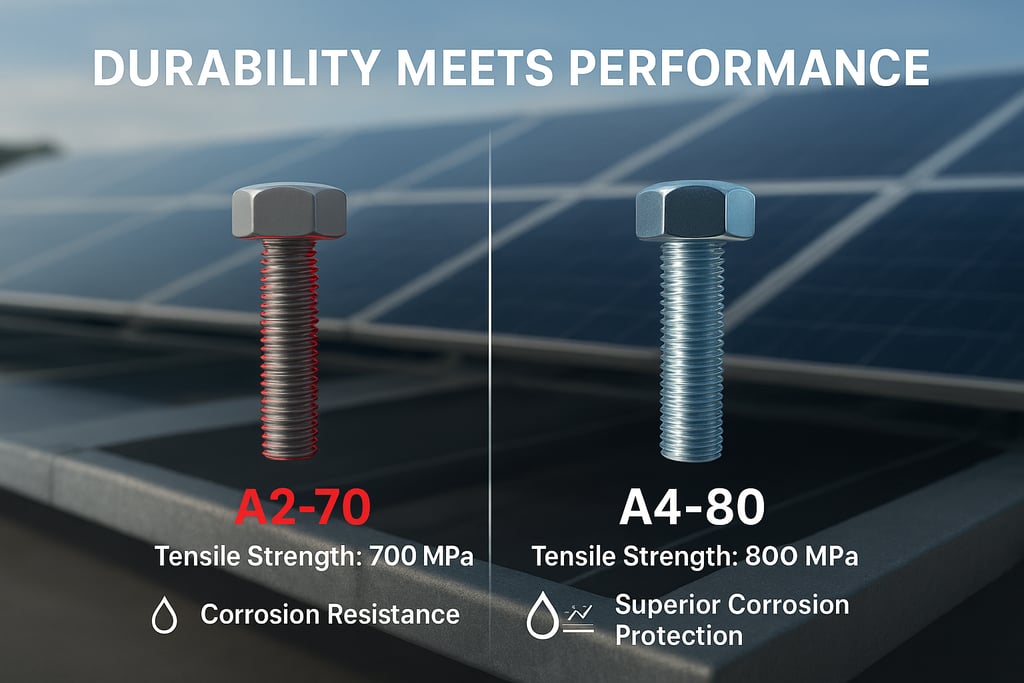A2-70 vs A4-80: Stainless Steel Fasteners for Solar
Discover the difference between A2-70 and A4-80 stainless steel fasteners for solar installations. Learn which grade offers better corrosion resistance and strength.
GENERAL & INFORMATIVE ARTICLES


Top Grades of Stainless Steel Fasteners Used in Solar Installations: A2-70 vs A4-80
Fasteners in solar photovoltaic (PV) systems play a pivotal role in ensuring long-term mechanical stability, corrosion resistance, and overall performance. Two grades — A2-70 and A4-80 — dominate the solar mounting fasteners market due to their balance of mechanical strength and corrosion protection.
This technical brief by Bait Alnuhas outlines the key differences, applications, and selection criteria between these two stainless steel grades for optimal performance in solar infrastructure.
1. Introduction: Why Material Selection Matters in Solar Structures
Solar PV installations are designed for service lifespans exceeding 25 years, often in high-exposure environments such as deserts, coastal zones, and high-humidity regions. In these conditions, fastener material selection becomes critical — suboptimal grade choices can lead to corrosion, loss of preload, and premature system degradation.
Among stainless steel fasteners, A2-70 and A4-80 are the most commonly specified grades for solar applications due to their mechanical strength and environmental compatibility.
2. Understanding Stainless Steel Fastener Grades
Fastener grades such as A2-70 and A4-80 follow the ISO 3506 standard, which classifies stainless steels used in bolts, nuts, and screws based on chemical composition and mechanical properties.
GradeMaterial TypeTypical Alloy CompositionTensile Strength (MPa)Key PropertyA2-70Austenitic Stainless Steel (Type 304)18% Cr, 8% Ni700 MPaExcellent general corrosion resistanceA4-80Austenitic Stainless Steel (Type 316)16% Cr, 10% Ni, 2–3% Mo800 MPaSuperior pitting & crevice corrosion resistance
3. A2-70 Fasteners — The Workhorse for Standard Solar Projects
A2-70
Technical Characteristics
Tensile Strength: 700 MPa (ISO 3506-1)
Yield Strength: Approx. 450 MPa
Corrosion Resistance: Excellent in neutral and mildly acidic environments
Temperature Range: Up to 300°C continuous service
Magnetic Properties: Non-magnetic in annealed condition
Applications
Recommended Applications
Ground-mounted solar arrays in dry inland regions
Roof-top solar installations in urban environments
Non-marine, non-industrial exposure zones
Advantages:
Cost-effective
Readily available
Easy fabrication and threading
Limitations:
Susceptible to chloride-induced pitting corrosion
Not ideal for coastal or high-salinity conditions
4. A4-80 Fasteners — The Premium Choice for Coastal and Harsh Environments
A4-80
Technical Characteristics
Tensile Strength: 800 MPa (ISO 3506-1)
Yield Strength: Approx. 600 MPa
Corrosion Resistance: Exceptional — withstands chlorides, acids, and industrial pollutants
Temperature Range: Up to 400°C continuous service
Magnetic Properties: Non-magnetic
Applications
Recommended Applications
Coastal solar farms with salt-laden air exposure
Desert installations with high temperature fluctuations
Industrial rooftops near chemical processing zones
Advantages:
Extended lifespan (25+ years)
Minimal maintenance requirements
High mechanical strength and corrosion protection
Limitations:
Higher cost compared to A2-70
Slightly lower availability in some regions
5. Comparative Analysis: A2-70 vs A4-80 in Solar Installations
PropertyA2-70 (Type 304)A4-80 (Type 316)Tensile Strength700 MPa800 MPaCorrosion ResistanceGoodExcellent (with Mo addition)Chloride ResistanceModerateHighSuitable for Coastal AreasCost EfficiencyService Life (Solar Applications)15–20 years25+ yearsBest Use CaseInland solar installationsCoastal & industrial solar farms
6. Environmental Application Guide
Selecting the right stainless steel grade depends on your specific environmental conditions:
Inland / Dry Environments
Recommended: A2-70
Low humidity regions
Minimal airborne contaminants
Urban and suburban settings
Cost-effective solution
Coastal / Marine Environments
Recommended: A4-80
Salt-laden air exposure
High humidity conditions
Offshore installations
Long-term durability required
Industrial / Chemical Environments
Recommended: A4-80
Chemical processing areas
High pollution zones
Acidic or alkaline atmospheres
Maximum corrosion resistance needed
7. Bait Alnuhas — Engineering Fastening Reliability for Solar Infrastructure
At Bait Alnuhas, we supply both A2-70 and A4-80 stainless steel fasteners that meet international standards such as ISO 3506, DIN, and ASTM A193/A194.
Quality Testing
Tensile and hardness testing with salt spray (ASTM B117) and humidity chamber tests
Precision Engineering
Dimensional and thread accuracy inspection for perfect fit and performance
Full Traceability
Batch-level traceability and MTC documentation for quality assurance
Expert Guidance
Technical support to select the right material grade for your specific application
Conclusion: Selecting the Right Grade for Long-Term Efficiency
The choice between A2-70 and A4-80 stainless steel fasteners ultimately depends on site conditions, environmental exposure, and budget. While A2-70 provides an economical solution for standard installations, A4-80 delivers superior performance in harsh, saline, or high-moisture zones — ensuring the mechanical integrity and operational reliability of solar assets throughout their design life.
In summary:
A2-70 = cost-effective reliability for inland sites
A4-80 = corrosion-proof strength for coastal and industrial environments
For project-specific guidance and grade recommendations, consult Bait Alnuhas — your trusted partner in fastening the foundations of renewable energy.
A2-70 vs A4-80 stainless steel fasteners Solar mounting fasteners supplier UAE Stainless steel bolts for solar panels Type 304 vs Type 316 fasteners Corrosion-resistant fasteners for renewable energy Bait Alnuhas stainless steel fasteners
Need Expert Guidance for Your Solar Project?
Partner with Bait Alnuhas for the right stainless steel fasteners for your solar installation. Our technical team can help you select the optimal grade based on your environmental conditions and project requirements.
